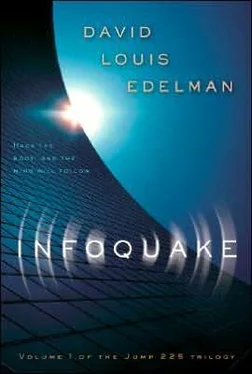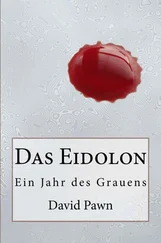"Why wouldn't he want to be found?" Merri asked.
Glum silence shrouded the table.
"If any of us had the slightest inkling of how Natch thinks, we wouldn't have signed on to this bloody fiefcorp in the first place," said Jara. "Let's get moving. It's one-thirty now. Everybody report back here at nine a.m. sharp."
Natch stood alone on the beach.
Civilization had not reached this place yet, or maybe it had left long ago and taken all of culture's detritus with it. The billboard advertisements, the black code darts, the tube tracks, the hoverbird clouds, the political manifestos, the buildings both large and small, the silly trappings of fashion-all of them gone.
The world reduced to sand, sky and sun.
The world a million years after humanity had breathed its last gasp.
The sun had risen to its midday perch and looked as if it might stay there for a while. Beneath his feet, the sand had begun to absorb the heat. As the temperature rose and the sand began to sizzle, tiny creatures burrowed their way to the surface of the beach. Sand mites by the millions scrambled around, wildly looking for some relief from the burning, but there was none to be found.
Natch closed his eyes and cast his mind out to the Data Sea to find a bio/logic program that would protect his tender soles, but he could find none. No bio/logic programs, no chatter from the drudges, no Data Sea. Was the vast corpus of human knowledge extinct too? Had it ever existed at all in this place? He opened his eyes again and scanned the horizon, looking for something, anything. A tree to shelter under, a rock with a cool face to it. But the world was completely flat and featureless.
He had begun to hop up and down to ease the burning, when he felt an icy drop of water tickle his feet.
The tide was rising. The water carved rivulets in the sand dunes as it spilled onto the beach. Natch leapt down towards the sea and dunked his feet in the spray. He heaved a tremendous sigh of relief and allowed the anxiety to slip from his mind.
Minutes passed before Natch noticed the vast panicked retreat going on in the sand. Millions of tiny creatures-sand mites, miniature crabs, black segmented insects-all dashing pell-mell for higher ground. The saltwater was licking his ankles before he came to a sudden realization: the insects weren't fleeing the heat, they were fleeing the tide.
He turned and headed back up the beach. But the tide was rising faster than he could run. By the time he overtook his own footprints running in the opposite direction, they were submerged beneath half a meter of water. Natch began running as fast as he could, lifting his legs in the air, stork-like, to stay above the tide.
The ocean had risen up above his knees when he realized he was not going to make it. The angle of the beach was too shallow, the progress of the tide too rapid. The strip of land he had been aiming for receded farther and farther away with each second. Natch stopped for a minute and turned around to see if there was another place he could head for, someplace safe from the rising tide. But there was nothing in any direction now but endless sea.
He began scrambling madly for higher ground. His splashes were the only noise that could be heard anywhere; the ocean itself did not crash or break or even ripple. Its surface was unbroken and lifeless. Eternal.
The water rose up to his chest, and Natch abandoned all hope of wading. He tried to leap up into a swimming position, but a remarkably strong force pulled on his legs, keeping him down. A deep underwater vortex into which the entire world would eventually sink.
Natch struggled wildly, clinging to his ambitions and desires. MultiReal was out there somewhere. So were number one on Primo's, a lunar estate, riches, glory. But one by one, he could feel all his cares draining out of him and sliding deep into the watery void. There were no fiefcorps down in that demesne of the drowned, no fiefcorps or memecorps or bio/logic programs or Primo's ratings.
He desperately tried to keep his head above water, but the current was too strong. The tide of nothingness, the Null Current, pulled him under.
Natch could see the light of the sun receding. He could feel the tug of the nothingness below, which was his final destination. His struggles and his worries seemed so petty once the Null Current had pulled him in. Down here, desire was irrelevant, because the undifferentiated mass of nothingness that was his destination allowed no changes, accepted no arguments, admitted no standards by which to measure and compare. In the deeps, there was nothing to want because there was nothing to gain, nothing to fix because there was nothing to break.
He stopped struggling as the darkness closed in, as the surface became a distant memory, as he was sucked down by the vortex that had no end, the vortex that spiraled down infinitely until it was no longer a vortex, until he and it and everything else melted together and merged into one endless eternal line, a vector pointing nowhere, a vector whose beginnings were irrelevant and improbable, and whose end was forever unreachable.
The apartment building was not much to look at by West London standards, but for Shenandoah, it had style in abundance. One might have said the building jutted out from the side of a hill, if not for its sine-wave shape that architects often used to camouflage the constant structural flux. A more appropriate description would have been that the building rippled or undulated from the hillside. Not the kind of thing you found crammed amidst the pointed abbeys at Bishopsgate.
Horvil had been inside the building a thousand times, of course, at all hours of the day and night. But he usually skipped the exterior view and multied straight to the network gateway in Natch's foyer. Funny how you could spend so much time embedded in a place that you didn't really know what it looked like from the outside.
From the ground, the engineer looked up the side of the tenement and saw several balconies like the one where he, Natch and Jara had stood and tested NiteFocus 48. It seemed like a million years ago, during a vanished era of innocence. Now all the building's balconies were occupied by strangers.
Horvil walked inside the front doors, nosed around the atrium for a few minutes, then ascended the lift to Natch's flat. He hesitated at the fiefcorp master's door for a few seconds. If Natch wasn't here, the apartment security program would probably let a trusted presence like Horvil invoke emergency protocols and enter. But that would trigger warning messages to Natch and possibly the building management as well. He didn't mind Natch receiving such a message-the entrepreneur might actually respond and put an end to this madness-but how much could you really trust a landlord these days? A series of gloating drudge headlines flashed in Horvil's brain: BREAK-IN LEADS TO MASSIVE MANHUNT FOR MISSING FIEFCORP MASTER.... NATCH LEAVES APPRENTICES HIGH AND DRY.... MISSING ENTREPRENEUR `A WORTHLESS HUMAN BEING,' SAYS LANDLORD.
Horvil entered, stood in the foyer and counted to twenty. Nothing happened.
It took Horvil only a few minutes to determine there was no bloody corpse stinking up the premises. No scattered debris on the counters, no slack body standing on the red tile, no sign of a struggle. But he could see no evidence the place had been inhabited the past few days either. Not that Natch's messes could compare to the colossal disasters Horvil usually left for his cleaning bots, but a few half-drunk cups of chaff or nitro could usually be found on his table at any given time. Today, however, nothing.
Horvil knew the real test was not in the common areas, but in the office. That was where Natch spent most of his time anyway. The engineer poked his nose into the room and made a major discovery: Natch's bio/logic programming bars were gone. Of course, they could be lying in one of the drawers under the workbench, drawers that a multi projection could not physically open. But in all the years Horvil had known him, Natch had never set his programming bars anywhere but the top of the bench or on a side table within easy reach.
Читать дальше






![David Jagusson - Fesselspiele mit Meister David [Hardcore BDSM]](/books/486693/david-jagusson-fesselspiele-mit-meister-david-har-thumb.webp)





